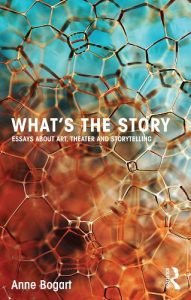Anne Bogart is an award-winning theatre maker, and a best-selling writer of books about theatre, art, and cultural politics. In this her latest collection of essays she explores the story-telling impulse, and asks how she, as a ‘product of postmodernism’, can reconnect to the primal act of making meaning and telling stories. She also asks how theatre practitioners can think of themselves not as stagers of plays but ‘orchestrators of social interactions’ and participants in an on-going dialogue about the future.
We dream. And then occasionally we attempt to share our dreams with others. In recounting our dreams we try to construct a narrative... We also make stories out of our daytime existence. The human brain is a narrative creating machine that takes whatever happens and imposes chronology, meaning, cause and effect... We choose. We can choose to relate to our circumstances with bitterness or with openness. The stories that we tell determine nothing less than personal destiny. (From the introduction)
This compelling new book is characteristically made up of chapters with one-word titles: Spaciousness, Narrative, Heat, Limits, Error, Politics, Arrest, Empathy, Opposition, Collaboration and Sustenance. In addition to dipping into neuroscience, performance theory and sociology, Bogart also recounts vivid stories from her own life. But as neuroscience indicates, the event of remembering what happened is in fact the creation of something new.






